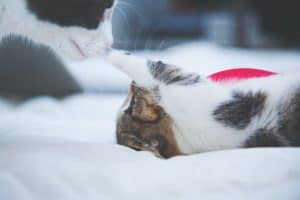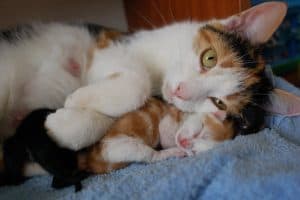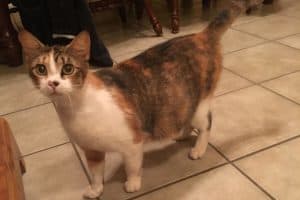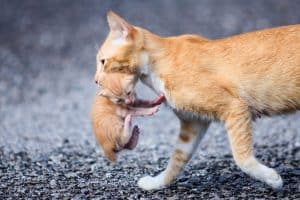Why does mom cat hate her son? In the mysterious world of feline behavior, the dynamics between a mother cat and her offspring can sometimes be puzzling.
Answer:
Mom cats may display aggression or rejection towards their own kittens for a variety of reasons, such as hormonal changes, stress, or personality differences. Understanding the root causes can help unravel this enigmatic relationship.
Hormonal Changes
Have you ever wondered why a mom cat may seem to hate her own son? One key factor to consider is the impact of hormonal changes during pregnancy and postpartum. Just like human mothers, cat moms experience fluctuations in hormones that can significantly affect their behavior towards their kittens.
During pregnancy, a mother cat’s body goes through various hormonal shifts to support the development of her litter. These changes can lead to heightened stress levels and increased irritability, causing the mom cat to exhibit aggressive or rejecting behaviors towards her kittens, including her son.
Furthermore, after giving birth, the mom cat’s hormones continue to fluctuate as she goes through the demanding process of caring for her offspring. This period of vulnerability and sensitivity can make the mother cat more reactive to perceived threats or stressors, potentially leading to negative interactions with her kittens.
Understanding the role of hormonal changes in a mother cat’s behavior is crucial in addressing any issues between a mom cat and her son. By recognizing the biological factors at play, pet owners can take proactive steps to create a supportive environment for the cat family and help mitigate any potential conflicts.
For more information on how hormonal changes impact a mother cat’s behavior, check out this resource: Understanding Hormones in Cats
Stay tuned for more insights into why a mom cat may dislike her son.
Stress and Anxiety
When it comes to exploring why a mom cat may exhibit hostility towards her own son, stress and anxiety play a significant role. Just like humans, cats can experience stress from various factors, which can manifest in their behavior towards their offspring.
External stressors such as changes in the environment, disruptions in routine, loud noises, or the presence of unfamiliar animals can trigger anxiety in a mother cat. This heightened state of stress can lead the mom cat to lash out at her kittens, displaying aggression or avoidance behaviors towards them, including her son.
Additionally, a mother cat may feel overwhelmed by the responsibilities of caring for her litter, especially if she perceives a lack of support or resources. This sense of anxiety and pressure can further contribute to negative interactions between the mom cat and her kittens, impacting their relationship.
To address stress and anxiety in a cat family, pet owners can implement strategies to create a calm and secure environment for the mother cat and her kittens. Providing a quiet and safe space, maintaining a consistent routine, and minimizing external disturbances can help reduce the mom cat’s stress levels and promote a harmonious bond with her offspring.
Stay tuned for more tips on how to support a mom cat and her son through stressful situations.
Personality Clash
Understanding why a mom cat may hate her son can often be attributed to a personality clash. Just like humans, cats have different temperaments and energy levels. If a mother cat and her son have conflicting personalities, it can lead to tension and conflict within the feline family. For example, if the mother is more reserved and the son is more playful and rambunctious, she may become irritated by his constant need for attention and play. This clash in personalities can result in the mother cat displaying aggression or avoidance towards her son. It’s essential to recognize and respect these individual differences to help foster a harmonious relationship within the cat family.
Maternal Instincts
Maternal instincts play a significant role in the behavior of a mother cat towards her kittens, including her sons. While maternal instincts are typically nurturing and protective, they can sometimes manifest in unexpected ways. In some cases, a mother cat may show aggression towards her son as a way to establish dominance or discipline. This behavior can be a result of the mother cat trying to teach her son boundaries and social skills. It’s essential to remember that a mother cat’s actions, even if they seem harsh, are often driven by her natural instincts to ensure the survival and well-being of her offspring.
Additional Insight: Socialization
Another factor that can contribute to a mother cat’s dislike towards her son is the socialization process. If the kitten did not receive proper socialization during the critical developmental period, it can result in behavioral issues that may cause tension between the mother and her son. Socialization plays a crucial role in shaping a cat’s personality and interactions with others, including family members. Lack of proper socialization can lead to misunderstandings and conflicts between the mother cat and her son. It’s important to provide opportunities for positive social experiences for both the mother and her kittens to promote healthy relationships within the feline family.
Remember, understanding and addressing the underlying reasons for a mother cat’s negative behavior towards her son can help improve their relationship and create a more harmonious environment for the entire feline family.
Socialization and Bonding
Early socialization plays a crucial role in fostering positive relationships between mother cats and their kittens. During the first few weeks of life, kittens learn crucial social behaviors from their mother, including how to communicate, play, and interact with other cats. If a mother cat lacks proper socialization skills or has had negative experiences, she may exhibit aggressive behavior towards her kittens, including her son. It’s essential to ensure that mother cats have a safe and nurturing environment to raise their kittens, helping them develop strong bonds based on trust and security. By providing a supportive environment and positive interactions, you can help promote healthy socialization and bonding between mother cats and their offspring.
Behavioral Training
Addressing aggression and hostility in cats, including a mother cat’s dislike of her son, requires patience and understanding. Positive reinforcement techniques, such as rewarding good behavior with treats or praise, can help encourage more positive interactions between cats. Additionally, redirection methods, such as providing toys or activities to divert attention away from negative behaviors, can help prevent conflicts between mother cats and their kittens. It’s important to address aggression early on and seek guidance from a veterinarian or animal behaviorist if needed to ensure a safe and harmonious environment for all cats in the household.
Additional Insight:
A structured feeding schedule can also help reduce tension between mother cats and their kittens. By feeding them separately and providing individual feeding stations, you can prevent competition and reduce the likelihood of aggressive behavior during meal times. This can promote a more peaceful and positive relationship between mother cats and their offspring.
Seeking Professional Help
If you notice persistent conflict between a mom cat and her son, it may be time to seek professional help. A veterinarian or animal behaviorist can provide expert guidance on how to address and resolve issues between the feline family members. They can offer insights into the underlying causes of the conflict and recommend effective strategies to improve their relationship. Don’t hesitate to reach out for professional assistance if the situation does not improve on its own.
Dive into the World of Feline Behavior
Mother cats have fascinating relationships with their offspring. Did you know that some mom cats may exhibit aggressive behavior towards their sons to encourage them to become independent? This behavior is rooted in their instinct to protect their territory and ensure the survival of their genes. Understanding these dynamics can help you better comprehend why a mom cat may appear to “hate” her son. By diving into the world of feline behavior, you can gain valuable insights into the complexities of their relationships and how to support harmony within the cat family.
Fascinating Facts about Mother Cats and Their Offspring:
- Maternal Bond: Mother cats have a strong maternal bond with their kittens, providing them with essential care and protection during their early stages of life.
- Teaching Independence: Mom cats may display tough love towards their sons to teach them independence and survival skills.
- Territorial Instincts: Aggressive behavior towards older offspring can stem from the mom cat’s instinct to protect her territory and resources.
- Social Hierarchy: Cats have a complex social hierarchy, and conflicts between family members can arise as they establish their roles within the group.
- Time and Patience: Resolving conflicts between a mom cat and her son may require time, patience, and understanding of feline behavior.
For more in-depth information on feline behavior and relationships, you can explore resources such as the American Association of Feline Practitioners website, which offers valuable insights from experts in the field.
Alex, a passionate animal lover, has experience in training and understanding animal behavior. As a proud pet parent to two dogs and three cats, he founded AnimalReport.net to share insights from animal experts and expand his knowledge of the animal kingdom.




